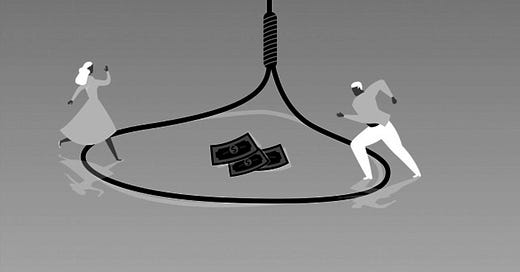Job Interviews or Job Traps
What to look for during Job Interviews to prevent you falling into a Job Trap
Job hunting can be stressful, and receiving a job offer often feels like a major accomplishment.
However, it's essential to remember that the decision to accept a position is a two-way street. In my experience, not all job offers are created equal, and it's crucial to carefully evaluate opportunities before committing to it, it does not mean you have to take it blindly if you are offered it.
In the summer of 2023, pre-working at RWA Financial Services, I was temping at a solicitor in Ashton Under Lyne for a few months when I went for an interview online with some company for an Admin I won’t name here for legal reasons.
The position in question seemed standard enough for this insurance company not too dissimilar to what I did at the Co-Operative, so I was interested. I received an invite to go to Microsoft Teams for an online interview, and I went online at 9 am. I was greeted by two youngish managers who within the space of two minutes, changed the hours of the job (7 am – 5.30 pm – 42.5 hours a week instead of 37 hours) and the salary and not the advertised salary of £26,000, rather a little more than minimum salary.
More damning I was then advised that the job was a Customer Service role which would involve sitting on the telephone all day in contrast to a Billing Administrative which was advertised.
Over the interview, it became apparent within a few minutes that the team would be full of people close to half my age, and that their idea of team bonding was spending in one of the local bars next door to the office which the section head would put a tab on once a month.
As a registered Diabetic, this held no interest for me in the slightest, and the full attitude of the two managers put me right off, I lost interest in the matter of a few minutes and simply went through the motions thinking no chance in hell.
The fun started three days later when out of the blue, they then offered me the job.
Stunned? Yes, I certainly was but I knew I had to keep my feelings out of what had happened during this interview and look at the job from an objective perspective whether I should take this offer of employment or not.
To help me plan for deciding whether I should or shouldn’t take this role, I considered all of the following points:
RED FLAGS
Discrepancies in Job Description: The significant differences between the advertised role and the actual position are a major red flag. It’s essential to trust your instincts if something feels off.
Unrealistic Expectations: Excessive working hours, low pay, and a mismatched company culture can lead to job dissatisfaction and burnout.
Poor Interview Process: The unprofessional behaviour of the interviewers, such as the abrupt change in job terms without prior notice, is indicative of a company's overall work environment.
THE IMPORTANT OF SELF-PRESERVATION
Declining a job offer, even when faced with financial pressures, is a valid decision. Prioritizing your well-being, both physical and mental, is crucial.
Protect Your Mental Health: A toxic work environment can have detrimental effects on your mental health. It's better to avoid such situations altogether.
Value Your Time: Your time is a valuable asset. Accepting a job that doesn't align with your career goals or work-life balance can be a missed opportunity.
Maintain Your Professionalism: While declining a job offer can be uncomfortable, it's essential to do so professionally. A polite and concise explanation is sufficient.
TIPS FOR NAVIGATING JOB INTERVIEWS
Thorough Research: Research the company and the role thoroughly before the interview. This can help you identify potential red flags early on.
Ask Questions: Don't hesitate to ask questions during the interview. This demonstrates your interest and helps you gather information about the company culture and expectations.
Trust Your Instincts: If something doesn't feel right, trust your gut. It's better to decline a job offer than to regret accepting it later.
Remember: Your career is a marathon, not a sprint. Taking the time to find the right job is essential for long-term job satisfaction and success.
By being mindful of these factors and prioritizing your well-being, you can make informed decisions about your career path and not enter a role you know you would be deeply unhappy in moments.
Ultimately, the job-seeking process should be a collaborative one, where both the candidate and the employer assess if it's a good fit.
By carefully considering factors like job description accuracy, work-life balance, company culture, and personal well-being, you can make informed decisions that lead to long-term job satisfaction and success.
Done incorrectly, as I could have done, I could have easily ended up in a job I hated within weeks and likely would have caused total burnout quickly.




